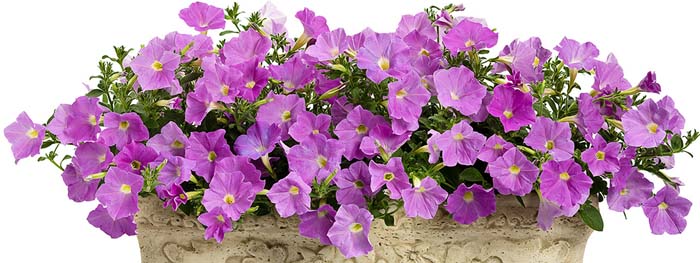Petunia Care: How Much Sun, Water & Fertilizer Do Supertunias Need?
 |
| Supertunia® Bordeaux™ Petunia |
HOW TO TAKE CARE OF PETUNIAS ALL SEASON LONG
Here are some basics to help you succeed with Supertunia® petunias in your garden. The three big requirements are:
- Sun
- Water
- Feeding
These are the three things you must keep in mind to have the best performance from your Supertunias.
DO PETUNIAS LIKE SUN OR SHADE?
Ideally, petunias bloom best if they are grown in six hours of direct sun per day, with most of that sun coming in the afternoon. However, they will also grow in part sun, meaning four to six hours of direct sun, especially in warmer climates.
Think of it this way, for Supertunias sun = energy – they need this energy to keep producing more flowers, because flowers require energy to produce. The more energy the plant has the better the flowering. With sun and Supertunia, more is almost always better!
HOW OFTEN SHOULD I WATER MY PETUNIAS?
Petunia care starts with consistent watering. They can tolerate a little more or a little less, but the key is to be consistent. The more they receive their needed water on a regular basis, the more reliable they are in producing new flowers.
Things get dicey when someone forgets to water and plants become very dry, or if someone gets carried away and makes the plant soggy. Those extremes are harder for the plant to deal with than regular watering. When the plant is stressed by the extremes, they stop producing flowers and just try to survive – you never want your flowers to have to make that decision!
The amount of water petunias need fluctuates a bit through the seasons. Here are a few petunia care watering tips:
- To test whether or not your petunias are ready to be watered, stick your finger down into the soil to the depth of your first knuckle. If it feels dry, it's time to water. Once you've had some practice, you'll be able to tell by the weight of your planter whether or not the soil is dry.
- Petunias planted in pots, window boxes or hanging baskets will dry out more quickly and therefore will need more frequent watering than those planted in landscape beds.
- In the spring when there is rain and cool nights and your petunias haven't grown much yet, they need just enough water to keep them moist.
- As the summer progresses, the heat, sun, wind and pot size may all cause your petunias to need more water.
- As fall weather settles in and night temperatures start to cool off, you’ll notice your petunias stay moist longer with each watering and need less water overall.
DO PETUNIAS NEED FERTILIZER?
Yes! If sun = energy, then fertilizer = food. It is hard to get up each day and produce 50 new flowers without having breakfast. Think of how hard it would be to go to work without any food for days on end. Plant food is essential for petunias; they are the hungry teenagers of the annual world.
Feeding petunias planted in the ground:
Since they have more root space to grow in the ground and the plants can send their roots out further to find it, petunias growing in-ground don't need to be fed as often as those growing in containers. The most important feeding comes at planting time. Include some Proven Winners Continuous Release Plant Food in the hole when you plant your petunias. For excellent petunia care, scatter another dose around the base of the plants half way through the season. If you notice the blooms are slowing down, you can give them a boost with Proven Winners Water Soluble Plant Food.
Feeding petunias planted in containers:
When grown in containers, petunias need to find all of their nutrients within the confines of the container instead of having the luxury of seeking it out further in the ground. Plus, each time you water your containers, traces of fertilizer are flushed out the drainage holes. That's why it is extra-critical to feed petunias growing in containers. Start by mixing some Proven Winners Continuous Release Plant Food in with the potting soil when you first plant up your petunias. If your growing season is long, you can repeat the application about once every two months beginning half way through the season. Additionally, we recommend feeding your petunias with Proven Winners Water Soluble Plant Food every third time you water or once per week once they've settled in and begin growing in your containers.
 |
| Supertunia Mini Vista® Indigo |
What kind of fertilizer should I use?
We recommend using Proven Winners brand plant foods because they were formulated specifically to work with our plants. They are recommended for annuals growing in pots, containers, hanging baskets, combination plantings, window boxes and landscapes. We offer two types of plant food, both of which should be used with Supertunia petunias.
Proven Winners Premium Continuous Release Plant Food - The unique 15-7-15 NPK ratio of this fertilizer was designed specifically to maximize the flowering and plant growth of Proven Winners annuals. It includes multiple sources of Nitrogen for strong growth and color, Phosphorus, Potassium, Iron and all other key micro-elements to ensure peak plant performance. This type of fertilizer feeds plants continually throughout the growing season. The temperature-sensitive coating on the pellets delivers more nutrients during peak growing periods when the weather is the warmest and plants need food the most.
Proven Winners Premium Water Soluble Plant Food - This is a fast-acting and highly soluble fertilizer that starts feeding immediately once applied. The 24-12-17 NPK formulation includes multiple sources of Nitrogen for strong growth and color, Phosphorus, Potassium, Iron and all other vital micro-elements to ensure peak plant performance. An important distinction is the inclusion of the EDDHA form of Iron which allows plants to use Iron efficiently at wide pH ranges. This will help your petunias stay green, full and healthy throughout the growing season, even if you garden in a high pH soil. When mixed with water, you will notice it turns from blue to dark brown, which indicates the presence of EDDHA Iron.
See the application rates for Proven Winners Plant Foods.
How often do you need to fertilize petunias?
We recommend feeding your petunias with Proven Winners Water Soluble Plant Food every third time you water or once per week once they've settled in and begin growing in your containers. Additionally, we recommend mixing Proven Winners Continuous Release Plant Food in with the soil when you first plant your petunias. If your growing season is long, repeat the application of continuous release fertilizer half way through the season.
DO PETUNIAS NEED DEADHEADING?
While other branded and seed petunias need to be deadheaded to stay in bloom, Supertunia petunias are self-cleaning so there is no need to remove the spent flowers. Who wants to spend their summer picking off old blooms? Deadheading is not the same as trimming. All petunias benefit from getting a "haircut" a few times per season. Trimming involves cutting all or most of the stems back by as much as 20% to remove any spindly growth. If your Supertunias begin to look open or a bit tired, give them an allover trim. Learn more about deadheading.
HERE’S A GENERAL CALENDAR FOR CARING FOR YOUR SUPERTUNIA PETUNIAS ALL SEASON:
April - May/Spring – Time to buy and plant your petunias and plant food.
- If you live anywhere but the warmest climates, spring is the time to buy and plant your Supertunia petunias. (In zones 9-11, petunias are more commonly planted in the fall and grown through the following spring. *See NOTE below.) Remember to pick up some new Proven Winners Continuous Release Plant Food and Water Soluble Plant Food when you shop. Follow the package instructions and mix the continuous release plant food in with the soil when you plant petunias in containers and in the ground. Don't skip this important step!
June - Feed your petunias with Proven Winners Water Soluble Plant Food as they begin to grow.
- Once your petunias start to put on some significant new growth, it's time to start feeding them with water soluble fertilizer to support that growth. We recommend feeding potted petunias every third time you water or once per week. By now the Supertunia is really growing and starting to tumble down from the basket or fill out across the flowerbed.
July - Time for a meal and a haircut.
Around the Fourth of July, (after your big party) sprinkle another dose of Proven Winners Continuous Release Plant Food around the roots of your petunias. If you want a plant to grow like an elephant, you've got to feed it like an elephant!
At the same time, trim back the longer branches of your petunias to bring them back in line with the bottom of the container or basket. Give the plant an overall haircut at this time. Take care not to trim off more than 20% of the plant so it still can produce plenty of energy to support the new growth that will ensue as a result of trimming. Your plant won't have as many flowers after you trim it, but give it about a week to ten days and it will reward you with a fresh set of new leaves and flowers.
August - Keep up the watering and fertilizing during the heat of summer.
- Petunias really love the moisture levels in their soil to remain fairly consistent. When that happens, they reach their maximum growth and bloom performance. It's why self-watering AquaPots® work so well for petunias. During the hottest part of summer, you'll find that you need to water your petunias more often. Because nutrients are washed out of the soil each time you water, it's important to keep feeding your petunias through the heat so they have the nutrients they need to continue growing.
September-October - Enjoy the remainder of the season.
- Supertunia petunias are both heat and cold tolerant, plus they don't waste energy on forming seeds. Those traits help them continue to grow well into the fall months. If left in the ground, you might even catch them blooming until the first snow arrives. While the weather is still warm, give your Supertunias one more light trim and feed them with water soluble plant food to encourage the blooms to keep on coming a little longer. You won't need to water as often once the weather cools off because the soil will remain moist longer. Remember to do the finger test we described at the beginning of this article to know when it's time to water.
*NOTE: For folks in the deep south – your calendar will likely start & finish earlier. In the Deep South, petunias are commonly planted in the fall and grown through the following spring. Most petunias struggle in the midsummer heat and humidity, as well as the afternoon rains, in the warmest of climates. To extend their season a little longer, move your potted petunias where they will be protected from pounding summer rains, but make sure to keep them in the sun to maintain flowering.




